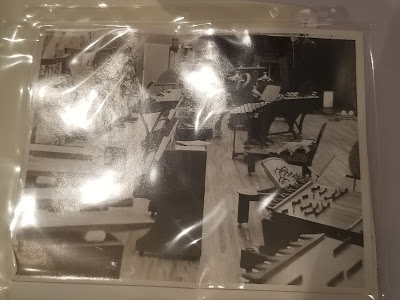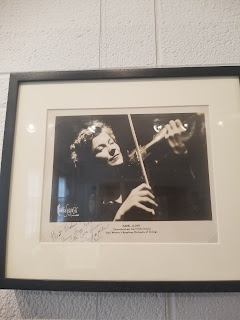An old college friend and I were chatting about records and music on
Facebook. We were sharing photos of recent finds and purchases, she shared a photo
of a Harry Partch LP; "The World of Harry Partch" on Columbia. If one finds a Partch record (that is in an affordable price range), it'll probably be this one. This LP marked the first occurrence of his work being released on a major label. It, no doubt, made him more visible as an artist.
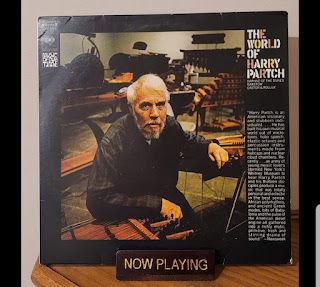 |
| "The World of Harry Partch" LP (photo by April Ridge) |
I'm a long time
fan and admirer of Partch.......I am also prone to falling down rabbit holes. I
started researching Partch; watching videos, listening to the music, and
reading articles, essays and perusing websites. I eventually discovered that
his archive is roughly 40 minutes away from my residence.
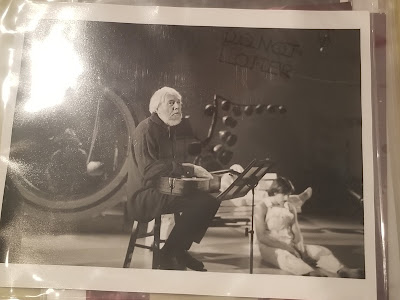 |
| Partch playing instrument |
I (without a second thought)
decided to take the day off of work so my son and I could spend the day at the
Partch Archive, maybe hit up some records stores and find some video games for
my son. With a big ol' cup of coffee in hand, we hit the road, stopping at an antique store where I found a few
records.
The Harry Partch Archive is located on the University of
Illinois campus in Champaign, Illinois. It is housed in the Harding Band
Building (The Sousa Archives and Center for American Music). Every piece of
sheet music that traveled with Sousa and his band is stored there, along with
the archive of cornetist Herbert L. Clarke. One can also find there, some of
the great photographs taken by Della Perrone and various artifacts concerning
the legendary C-U music scene (Vertebrats, Elvis Brothers, Scream, etc). When
we arrived, the archive coordinator met us around back. The Center had recently erected
two amazing exhibits on the early history of the saxophone (The Brown
Brothers, Tom Brown, Big Band, etc) and one on key figures in electronic music. The things I
found most interesting were the displays on The Musical Spillers, a
mixed-gender, all-black vaudeville act from the 1910s and the electronic
sound devices of James Beauchamp.
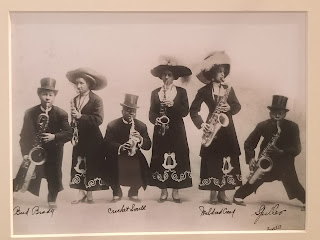 |
| The Musical Spillers. 1910s. |
 |
| My son Silas in front of Electronic sound device |
 |
| James Beauchamp electronic sound device |
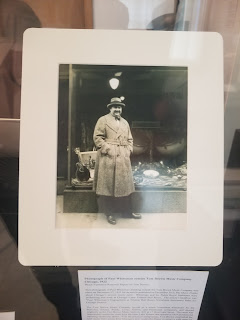 |
| Paul Whiteman |
 |
| Tom Brown and The Brown Brothers |
After a short but informative tour, we were taken to a small room wherein contained the Partch Archive. Boxes upon boxes of sheet music, manuscripts, photos, recordings (nearly all media formats), videos, letters, notes and others papers, clothes, etc. Sadly none of Partch's musical instrument-creations-inventions were among the archive. Partch was well known, not only for laying the groundwork for experimentation in music but for inventing, developing and constructing his own unique musical instruments. The
Chromelodeon, the
Zymo-Xyl are but a few. The bulk of these instruments are stored in Seattle. Not being played. One of the first tidbits I can recall learning about Partch was the witty statement that "he gets his instruments from the aisles of the hardware store." This oft-repeated statement rightfully spells out the level of his artistic/creative eccentricities (this statement is often misattributed to Tom Waits). These instruments were tuned specifically to Partch's preferred just intonation and microtonal scales.
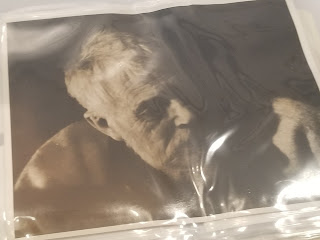 |
| Harry Partch |
His methods and theories went far beyond what was standard, or normal in Western music. Ultimately, he rejected the many traditions within Western music. He took influence from the music (and sounds) of China (Asia, in general). He is a key figure in the development of experimental music and all its styles (minimalism, music-concrete, etc).
 |
| Harry Partch and others working |
 |
| Harry Partch |
 |
| Harry Partch |
 |
| Musician playing Partch instrument |
His way of life and his personality were just as eccentric and transgressive as his music. Iggy Pop described him as "the gay, hobo genuis." He traveled extensively, staying in Europe for a time. For many years, his travel within the U S. was done in the manner of a hobo. He lived off of grants or by doing odd jobs. He had an affair with a famous actor. He was known to be difficult to work with (think Captain Beefheart). Much of his music was accompanied by elaborate theater performances. In their totality, these performances were massive, exhaustive works of art. When you hear the cliche phrase of "doing it one's own way," a person exactly like Harry Partch is being described.
 |
| Notegram from John Cage |
The Partch Archive is brought to you by one Danlee Mitchell. Partch was introduced to Mitchell in 1955 at U of I. The music theater performance "The Bewitched" was performed there in 1957. Mitchell later became Partch's heir and Executive Director of the Harry Partch Foundation.
 |
| Partch studio photos |
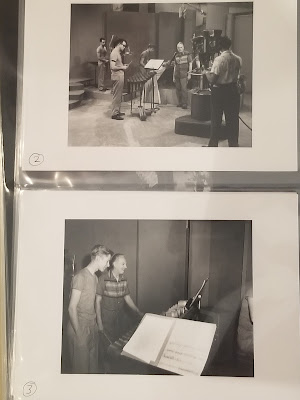 |
| Partch studio photos |
After several hours, my son and I departed the archive. There was so much we didn't get to see. Take some time out of one single day in your life and pay it a visit.....if only once. We then stopped at "Exile on Main Street," my favorite record store in the C-U area. I highly recommend it.
 |
| "Exile on Main Street" record store in Champaign, Illinois |
I picked up a 2nd pressing of Bowie's "Heroes" (at the time, I was on a mid-to-late 70s Bowie kick thanks to a podcast I had been listening to), a West Indies reggae original LP by The Mustangs (pressed in the Bahamas), an early 90s 45 by great punker Jeff Dahl, and a 60s instro 45 by some band named The Spins. At the antique shop, prior to visiting the archive, I picked up an original US pressing of The Soft Machine's 2nd LP, some odd local LP, a nice 78⁹⁹⁹ box full of 78s (hillbilly singer Clayton McMichen being the pick of the litter), and a spoof mag, from 1955, called "Cockeyed." It's basically a "Photoshop" prototype.
It was a great day. A day constructed of many musics is a day of many revelations.
 |
| David Bowie "Heroes" 2nd pressing |
 |
| The Mustangs Reggae/Bush Music (from Bahamas) |
 |
Early 90s punk rock
|
 |
60s instro
|
 |
| 1955 photoshop-like spoof mag |
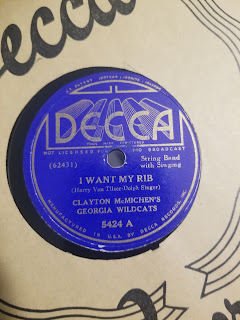 |
| Hillbilly 78 by Clayton McMichen |
 |
Cool old 78 box (only kept a few of the 78s, Clayton McMichen and a few by early black vocal group The Four Clefs)
|
 |
| 2nd LP by The Soft Machine (UK band) |





















